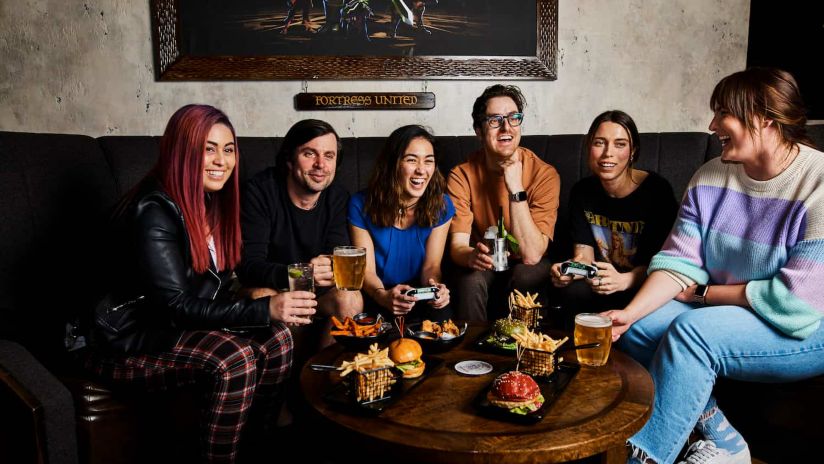How planning and strategy led to business growth for Fortress
Discover the business strategy behind culture company Fortress’s rise from a vision to a thriving reality.

Console VIPs at Fortress Melbourne
Fortress is an entertainment company that provides gaming, dining and events. We spoke to founder and CEO Jon Satterley, to discover how Fortress has grown from an idea into thriving flagships in Melbourne and Sydney.
Rolling the dice on a new business idea
Inspiration can strike at any moment. For Jon Satterley, the sight of a stadium packed with fans provided his spark.
“At the time, in 2004, I worked for a record label. I was on tour with a band in Korea, and one night I went to a stadium filled with 10,000 people,” Jon says.
But this crowd wasn’t there for the band. “All these people were there for esports, to watch teams play computer games. I couldn’t believe it.”
Gaming is a huge business. Recent research suggests the global gaming industry is eight times the size of the movie industry. Yet, Jon says gamers are an underserved community. This sowed the seed of a new business idea.
“I wanted to create out-of-home experiences for gaming and geek culture. I saw there was an opportunity to blend my passions – gaming, fantasy, science fiction and heavy metal culture – in a place for like-minded people.”
How Fortress resonates with a whole subculture
Fortress was born with the original intention to bring gamers together within an esports stadium experience.
The first flagship venue opened in Melbourne in 2020 followed by Sydney this year. Each site is 2,500 square metres and feature arcades, board games, PC and console gaming.
While the Melbourne and Sydney venues have esports arenas, they have a broader appeal to the wider fantasy and science fiction community.
“We’re much more than esports now. It’s still a part of our business, but we have adapted to our community. We have become a culture company,” Jon says.
Fortress’ venues feature fantasy-themed dining and bar experiences (called ‘Taverns’) and science fiction themed bars where customers can enjoy drinks, meals and events. Taverns include booths where groups can play consoles and board games and large round tables for Role Playing Games (RPGs), such as Dungeons and Dragons.
“Those people who love that culture just go ‘wow, this is built for me. This is my culture. These are my people.’”
Fortress has branched out into a range of events, all in keeping with the culture of which the company is part of.
“We have weekly events for customers, such as Dungeons and Flagons – a beginner's Dungeons and Dragons event on Sundays – and trivia nights on Mondays.
“We also do tournaments and promotions to celebrate big game releases, cultural moments or festivals... And we host third-party events.”
Fortress recently launched a membership scheme to reward frequent customers. The membership offers discounts on drinks, PC gaming, and free board game hire. This has further elevated their business growth through customer retention and boosting brand loyalty. Learn more about ways customer retention benefits your business.
“We devised the discounts and rewards to make membership a no-brainer if you came in more than twice a month,” Jon says. “We’re also thinking about exclusive promotions and nights to add more value for our members.”
New ideas fuel Fortress’ growth plans
With the popularity of the Melbourne and Sydney flagships booming, Fortress is looking at growth opportunities.
Jon and the team are considering two new venue concepts. The first are standalone Taverns. These would offer a similar themed experience but without the esports arena. The second new model is what Fortress calls a ‘Guild’.
“A Guild will be smaller than a Tavern or flagship and we’ll put them in an existing hub,” Jon explains. “Our flagships are in large shopping centres. But a Guild might be in a pub in a regional centre like Geelong or Newcastle.”
Different models mean Fortress can be flexible with their business growth strategy. They could open a Guild where the market might not justify an esports arena. Or they could put a guild in a student area in an existing pub where a site doesn’t have enough space for a full Tavern. Tailoring your business strategy to meet demand can help you identify new opportunities for business growth.
Jon also has his eye on overseas markets. “There's a huge opportunity, but it’s a case of deciding what’s feasible and what model we adopt. Do we licence or franchise others, or do we do it ourselves?”
Capturing their community’s imagination is the key to Fortress’ success
The key to Fortress’ success has been to create a business around Jon’s original insight. They have connected to a passionate but underserved community. It has resonated with the culture because Fortress’s people are from that culture. They understand what their customers want from their experience.
“That’s the connective tissue of our business,” Jon says. “We don't just operate pubs. We capture the imagination of people who love this culture. It’s about giving them the feeling there are places and epic experiences created for them to enjoy with their friends.”
With the business set to expand, more people will get to enjoy the unique ‘Fortress feeling’.
Disclaimer: This article does not necessarily reflect the views of Telstra or its staff.
Get involved in our Telstra Best of Business Awards
The Awards give small to medium-sized businesses a platform to celebrate their achievements and stories with peers. Plus, opportunities to learn from Australia's best business minds. Nominate your own or another remarkable business today.
Explore more on this topic
Internet that fits your business journey
Get internet that helps take you further. Our experts can help you find the right connection to power your business.




